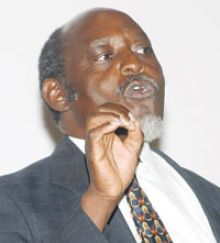Minister calls for EU support
STRYKER MOTLALOSO
Staff Writer
| Friday May 11, 2007 00:00


CITES holds its conference at The Hague, Netherlands on June 3. For years, Botswana and its southern African neighbours have been seeking to cull their excess elephant populations or to remove the animals from the list of endangered species. But countries like Kenya, whose elephants have been endangered by poaching, have fiercely opposed the proposals with backing from powerful American and European conservationists.
Meanwhile, Skelemani said the EU has played a pivotal role in Botswana's development process. He asserted that EU assistance to Botswana focused on sectors such as human resources development, natural resources HIV/AIDS, tourism and trade promotion. 'As a result of this assistance, we have scored some success especially in the fight against HIV/AIDS, human resource development, wildlife conservation and poverty alleviation,' said Skelemani. He disclosed that a new programme to support education and training through direct budgetary support introduced by the EU is a welcome development. He made an assurance that Botswana would effectively use such funds for the intended purposes.
The head of the European Delegation in Botswana, Ambassador Paul Malin said at the occasion that the EU has grown progressively and brought down barriers between its people since its formation. He said the EU recognises that the wealth of Europe lies in the knowledge and ability of its people and that is the key to growth, employment and social cohesion.
He pointed out that the EU is the world's biggest single market. It continues to share the prosperity it has fostered through increased cooperation with developed and developing countries, according to models that are suitable to their circumstances. He said the EU provides more than half of the world's development assistance. He stated that the cooperation between EU and Botswana dates back to the signing of the Lome Convention in 1975. The agreement provided for preferential access of Botswana goods to the European market and development of cooperation through the European Development Fund.
The EU has assisted Botswana in promoting economic diversification and alleviate poverty. It has funded the Gaborone Technical College and the soon to be opened Francistown College. Botswana's mining sector and tourism have benefited from the country's cooperation with EU cooperation. The EU support access to quality education and training in Botswana by contributing to the government budget, said Malin. However, he asserted that though the contribution is not visible for now, it is an efficient and effective way to give aid. 'Botswana, which has shown its ability to manage its budget with a high degree of accountability and transparency, can implement activities as part of its normal budget process and using its own procedures,' said Malin.
